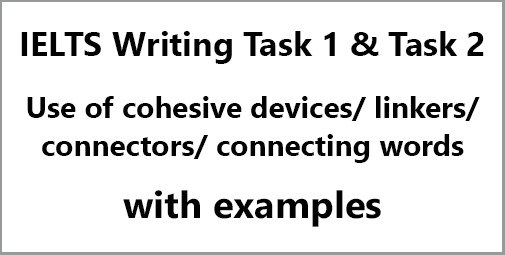In IELTS Writing, both in task 1 and task 2, using cohesive devices/ linkers/connecting words/connectors or linking words is very important. As the IELTS exam checks a person’s ability in using the English language, the Writing exam becomes very crucial. It is because the examiner can, in fact, has an overview of the test taker’s use of vocabulary, the range of grammar, coherence, cohesion, etc. Coherence and cohesion cover a quarter of the Writing exam marks. So, to make the description of the picture (Task 1) and the essay (Task 2) more effective in terms of coherence and cohesion, the successful use of linkers needs to be accurate and to the point. The following discussion on linkers is, hence, very important and you should have a close look at it. If you don’t understand the word or phrase, please have a look at the example sentences.
List of cohesive devices/ linking words/phrases with meanings and sentence usage:
1. To express reason/ cause:
Since: Since the USA was the largest exporter of fruits, the trade went well for them.
For: We cannot decide on the colors for our different views.
As: As the country goes under various reformations at a time, expecting rapid progress is not a good idea.
Because: I do not agree with it because I think this law seriously undervalues real talents.
Why: We know why the government has issued the documents.
You can also use due to/ owing to express reason or cause.
2. To express the result of what is said:
Consequently: He works hard. Consequently, he becomes successful.
N.B: You can use As a result/ Therefore/ So/ As a consequence/ Thus/ Hence/ Eventually/ As an outcome in the same place as the above-given sentence.
3. To express any sequence/ listing:
- The first step: First/ Firstly/ At first/ In the first place/ Initially/ At the initial point/ At the outset/ At the beginning/ In the beginning
At first, we need to warn the simple rural folks about this problem.
- The following steps: Next/ Subsequently/ After that/ Afterwards/ Then/ In the subsequent stage
Subsequently, we have to call a meeting with the village council.
- The final step: In the end/ At the end/ Lastly/ At last/ Finally/ At the closing stage
In the end, we should invite everyone to the meeting and discuss the issue.
4. To add more information to what is said:
Moreover: Moreover, some creative ideas can be collected from young investors.
N.B: Consider using Furthermore/ Besides/ In addition/ Additionally/ What’s more in the same place as the above-given sentence.
5. To give an example:
For instance: We can do various works for society. For instance, we can build shelters for homeless people.
N.B: You can use For example/ As an example/ In other words/ To illustrate/ To explain/ One other example is/ One specific example is in the same place as the above-given sentence.
6. To give an opinion:
In my opinion: In my opinion, the authority simply overlooks the whole thing.
N.B: Consider using I think/ I believe/ I concur/ I agree/ I admit/ I cannot accept that/ To me/ In my view/ I disagree in the same place of the above-given sentence.
7. To express similar ideas/ compare between the same:
Similarly: Similarly, the percentage of highly skilled workers improved over the last couple of decades.
N.B: You can use Likewise/ Also/ equally in the same place of the above-given sentence.
8. To express opposite ideas/ feelings:
However: However, the authority denies the fact that more actions could have been taken.
N.B: You can use On the other hand/ Conversely/ In contrast/ Nevertheless/ Although/ Even though/ Admittedly/ But/ Yet/ Still/ Nonetheless in the same place of the above-given sentence.
9. To highlight something:
Particularly: You can use it everywhere, particularly, in the rural territories.
N.B: Consider using Specifically/ Obviously/ Especially/ In particular/ Clearly in the same place of the above-given sentence.
10. To express the closing or ending:
In conclusion: In conclusion, the use of water should be carefully monitored for our better understanding.
N.B: You can consider using In fine/ To conclude/ Finally/ To sum up/ In a nutshell/ In brief/ To summarize/ In a word in the same place of the above-given sentence.
I hope you can use these linkers/connectors/cohesive devices in your writings and score better marks.
Please leave a comment if you think this post is helping you. Don’t be shy to put down some suggestions on how I can help you better.
Click here for solutions to Cambridge Test 6; complete speaking test
IELTS Speaking Part 2: A teacher who has greatly influenced your academic life
Cambridge IELTS 12 Test 5; complete the Speaking test with model answers
IELTS Speaking Part 2: Something useful you learned from your family
6 IELTS Preparation Tips for Reading Section
IELTS Reading: 10 steps which helped me to score 8.0 in Reading
Strategy for IELTS Reading: TRUE, FALSE, NOT GIVEN or YES, NO, NOT GIVEN
Introduction to IELTS writing graphs and charts: similarities and differences

